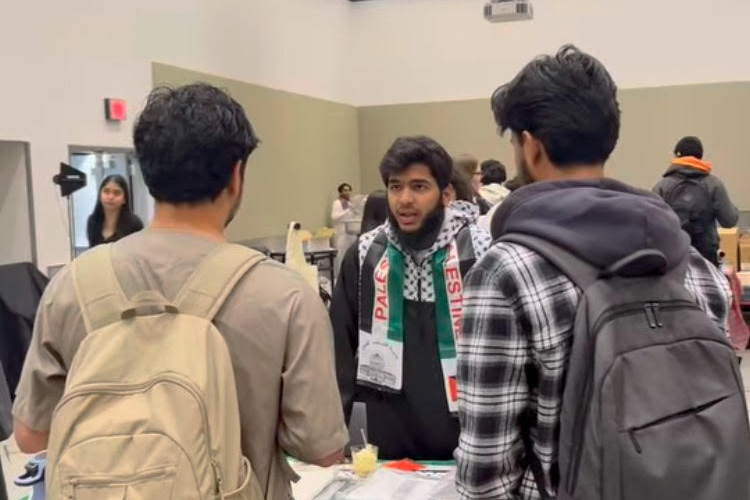When Muddassir Siddiqi stepped into his role as College of DuPage (COD)’s eighth president on July 1, 2025, he described the college as “a national leader among community colleges” and pledged to build on that legacy through innovation, access and community engagement.
But how do those priorities resonate with the people who will directly experience their effects? After interviewing Siddiqi, The Courier spoke with faculty union leaders and a student representative who served on the presidential search committee to get their perspectives on Siddiqi’s goals for the college.
David Goldberg, political science professor and president of the COD Faculty Association (CODFA), said Siddiqi’s early approach is promising.
“I think Siddiqi’s on the right track,” Goldberg said. “He recognizes the institution is at a crossroads and that there are cultural issues that need to be addressed. People want to feel respected and seen, and I think he understands that.”
The union as a whole, which represents more than 330 full-time faculty members, negotiates salaries, contracts, workloads and other working conditions. Goldberg said the union’s top priorities include hiring more full-time instructors, refocusing on academics and supporting faculty innovation to better meet student needs. What stands out most so far, he said, is Siddiqi’s communication style.
“Sometimes meetings can feel like checking a box, but from what I’ve seen with him, I feel like he’s really present in his communication, and I appreciate that,” Goldberg said. “The next step is seeing the follow-through. I’m hopeful, but only time will tell.”
In the past, faculty concerns have frequently been overlooked, leading to resentment among staff, said Goldberg.
“Requests for more faculty and resources were dismissed, reflecting weak leadership and an outdated, top-down approach,” Goldberg said. “It caused a lot of frustration. They’re listening and seeking our input now, which is promising. But we need time to see if they follow through.”
Susan Purcell, president of the COD Adjunct Faculty Association (CODAA), echoed the call for greater inclusion and collaboration. CODAA represents more than 690 adjunct faculty members who have taught at COD for at least three years, she said.
“Adjunct faculty bring a wealth of real-world experience and are deeply invested in student success,” Purcell said. “We hope the new administration listens to all faculty voices and values the contributions of both full-time and adjunct instructors.”
Adjuncts teach more than 70% of COD’s course sections, often without benefits such as health insurance or dedicated office space, Purcell said. They adapt creatively to support students, despite fewer resources.
She stressed the importance of taking a stand on the college’s long-held values of diversity, equity, and inclusion (DEI).
“Last year, when there was pressure to remove DEI language and committees, COD and its Board of Trustees refused to bow to those demands,” Purcell said. “Our values have been here for decades, and it’s critical that the new administration uphold them to protect the college’s reputation.”
There is deep institutional knowledge about the college held by faculty members, some of whom have taught at COD for decades, she said.
“We’ve seen many administrators come and go, but adjunct and full-time faculty are here for the long haul,” she said. “The new leadership needs to listen closely and engage with faculty to avoid costly mistakes and maintain the college’s strengths.”
Purcell hopes Siddiqi will balance thoughtful, deliberate change with respect for all campus voices, including the newly unionized classified staff and students, who play vital roles in the college community.
Second-year criminal justice, criminology and political science student Kristen Joyce Lopez served as one of five students who interviewed the finalists in the presidential search process.
“Prior to entering COD, I never anticipated how much this wonderful institution would mean to me,” Lopez said. “COD has been a place where I truly feel that people care for my opinion, and not just mine, but value student voices.”
When interviewing candidates, she prioritized human connection, she said. Being approachable and community-focused was important to her as a representative in the Student Leadership Council of the whole student body.
“I am someone who values interpersonal connections, so I imagined someone who would be easy to speak to, regardless of the topic,” she said. “Not only did that person have to be easy to talk to, I wanted someone who not only valued student voices but welcomed them.”
Lopez stressed the importance of amplifying the college’s diverse student body.
“We have individuals of different ethnicities, races and nationalities that we can truly learn from their experiences,” she said. “There are so many amazing stories to be heard here. I hope he prioritizes amplifying and encouraging student voices, and making them feel heard and seen.”
To stay informed and involved as a student, Lopez recommends people attend Board of Trustees meetings and participate in the open comment section to make their voice heard.
“Although I understand if a student is unable to attend these meetings in person, [Board of Trustees] meetings can be accessed online, as well as the agenda and meeting minutes,” she said. “I would recommend that for any student that is interested to hear more about the conversations around college leadership and decision-making.”
She also encouraged students to engage with the Student Leadership Council [SLC] and collegewide committees.
“In collegewide committees, students are able to have a seat at the table with faculty, staff, or administrators that have direct influence on that area of COD,” she said. “I truly recommend joining a collegewide committee for anyone who wants to stay informed in COD leadership and decisions on campus.”
Until they see real actions behind the promises, though, David Goldberg said that work around campus will still need to be done by the community.
“A lot of times those are buzzwords in academics, especially terms like ‘inclusivity,’” Goldberg said. “The problem is when people use the word without any real meaning behind it. You need to put resources, people and money behind those priorities, and that’s been lacking over the last 10 years. I want to wait and see that inclusivity is more than just a phrase, and I hope it is.”








